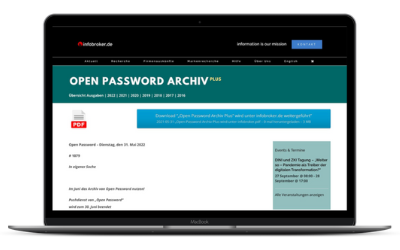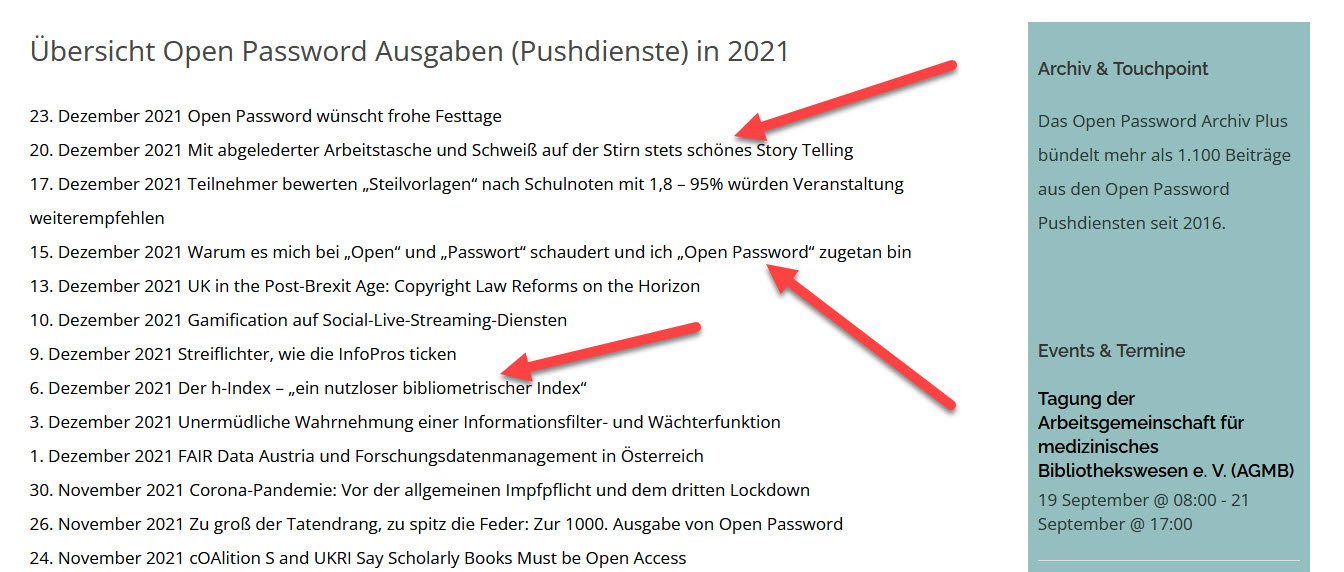Open Password – Montag,
den 28. Oktober 2019
# 651
Mary Ellen Bates – Proving Your Value – Jörg Weizendörfer – RightsDirekt – Outsell – Google – EU – Copyright Directive – Hugh Logue – Publisher – France – Link Tax – Content Aggregators – Social Media Platforms – Licencing – Snippets – Google News – Clicks – Ad Revenues – Spam – Consumers – Small Publishers – Search Engines – Propaganda – Facebook – Apple News – Bing – Regulators – Casetext – CARA Patent – U.S. Government Publishing Office – Law Library of Congress – ProQuest One Literature – Diversity – TOEFL Official App – Cambridge University Pres – Unbound – Crowdfunding – Open Access – Houghton Mifflin Harcourt – Taylor & Francis Online – Text to Audio Option – Outsell
Briefe
Wiederauftritt Mary Ellen Bates:
Proving Your Value – Making the Case
for Information Services
Zu: Die Informationsbranche im disruptiven Umbruch – Einsatz von Künstlicher Intelligenz wird zur Selbstverständlichkeit – Pressemitteilungen als Basis zur Einschätzung von Ausfallrisiken, in: Open Password, 4. Oktober, # 649
Lieber Herr Bredemeier,
im Zusammenhang mit der von Ihnen im heutigen Pushdienst erwähnten „ungekrönten Königin der Information Professionals“ Mary Ellen Bates erlaube ich mir, Sie hiermit auf ein für Ihre Leser ggf. interessantes Webinar aufmerksam zu machen.
Organisiert durch mein Mutterunternehmen Copyright Clearance Center (CCC), wird Mary Ellen Bates am 30. Oktober um 18 Uhr unserer Zeit in einem ca. einstündigen Webinar über Best Practices zur Verbesserung und Artikulation des Wertes von Informationszentren sprechen. Titel des Webinars: Proving Your Value: Making the Case for Information Services.
Weitere Informationen sowie die Möglichkeit zur (kostenfreien) Anmeldung finden Interessierte hier: https://go.copyright.com/l/37852/2019-10-01/v2dzlz
Mit freundlichen Grüßen aus Berlin
Joerg Weizendoerfer, Leiter Lizenzvergabe RightsDirect, jweizendoerfer@rightsdirect.com
Outsell´s October Contribution
Google Avoids Paying Publishers
Under EU’s Copyright Directive
„We sell ads, not search results“
By Hugh Logue
Google pours cold water on publishers’ plans to generate new revenue streams from the EU’s controversial new copyright law.
______________________________________________________________________
Important Details
______________________________________________________________________
Google has announced that it will not pay license fees to publishers in the EU to comply with the EU’s new copyright directive, and it will stop displaying snippets of their content on its Google service. France is the first EU member state to transpose the new Directive on Copyright in the Digital Single Market into national law, which comes into force in the country this month. France has been particularly proactive in implementing the Directive; although it came into force across the EU on June 7, 2019, member states are under no obligation to implement it before June 2021.
The Directive aims to align the digital single market and incentivize and fairly reward the creators of original content. Google’s decision enables it to comply with Article 15 — dubbed the “link tax” by critics — which covers the issue of linking to content, with the intention of giving news publishers more control over their content and rewarding them when their articles are used by online content aggregators and social media platforms. Licensing will be needed for up to two years after the date of publication by a publisher for content that is not deemed „insubstantial.”
Instead of showing news snippets, as it does now, Google intends to just display headlines to news stories on Google News. Currently, Google News and search display the publisher’s headline and a few lines of text (a “snippet”) as well as a small “thumbnail” image. After the new copyright law comes into force in France, Google will no longer display preview content in France for European news publications. However, Google also stated that publishers can choose to provide the content to Google for free.
Google claims in a blog post that to maintain its customers’ trust in its services, it cannot pay publishers when their content appears in search results, saying “we sell ads, not search results.” Google argues that it is already providing more than enough value to publishers in Europe by driving 8 billion clicks a month to their websites. It also says that its advertising technologies are enabling publishers to generate new ad revenue, which was worth more than $14 billion to publishers around the world in 2018.
_____________________________________________________________________
Why This Matters
_____________________________________________________________________
Outsell previously warned that Article 15 could simply drive Google and others to change how they operate to avoid paying publishers. It has a history of doing this: When Spain passed a similar law, Google simply closed Google News in the country. Unfortunately, European publishers looking forward to a revenue windfall from Google are likely to be left empty-handed; to make things worse, they may also lose traffic and the associated advertising revenue. However, publishers are still allowed to provide their content to Google for free if they choose.
A standoff is likely to emerge between Google and French consumers boycotting Google in support of journalism, which could drive consumers to other search engines that pay publishers’ license fees. Google’s tech giant brand is already suffering, something that publishers can exploit to put pressure on Google to reverse its decision. However, Google is trying to use France to send a clear message to other governments around the world considering similar measures. Any damage Google suffers in the short term in France, will be more than worth it in the long run if it succeeds in discouraging other governments, particularly those of US states, from adopting similar laws. Larger publishers will have the same objective on the other side: to demonstrate to lawmakers that, without their content, Google’s users will move to competing search engines that pay to support journalism.
The collateral damage from both the new rules and Google’s response could prove most detrimental for small specialist publishers whose content gets displayed on a level playing field alongside their larger competitors. While larger publishers pushed for Article 15, many smaller publishers were concerned that they would not be included in license fee negotiations, and search engines would drop their content unless they offered it for free. This would put smaller publishers at a disadvantage relative to their larger competitors.
With news content on social media and online becoming increasingly spammy and new regulatory attention on the quality of news, Google’s move will only make matters worse. Those that choose to provide their content for free to Google are likely to have an ulterior motive, such as to spread propaganda. This will reduce trust in Google, which faces an increased risk that a rival will take its market share because it is unable to reverse its decision without losing face after stating that it “sells ads, not search results.”
Publishers still have plenty of options to negotiate deals with other big tech providers — such as Facebook, Apple News, and Microsoft Bing — who may be keen to break Google’s dominant position in news search. Google is massively misreading the current climate of consumers and regulators’ disdain toward big tech, and especially the power of the people of France to create a new 21st-century revolution.
Internationale Nachrichten
KI bringt Patentdaten in die Kanzleien
Legal research platform Casetext Inc. is entering the patent space with its latest product, CARA Patent, scheduled for release in early 2020. CARA Patent is the latest expansion from Casetext, which launched in 2013 as a legal research tool to search documents online. In 2016 Casetext released the CARA (Case Analysis Research Assistant) platform, which leverages artificial intelligence to find cases that are relevant to briefs.
Digitalisierung der Law Library of Congress zurück bis 1817. The U.S. Government Publishing Office (GPO), in collaboration with the Law Library of Congress, has started a large multi-year effort to digitize and make accessible volumes of the U.S. Congressional Serial Set back to the first volume, which was published in 1817.
Besonderes Augenmerk auf literarische Diversität. ProQuest announces a solution to support all facets of literature scholarship: ProQuest One Literature. Developed in collaboration with faculty and librarians, ProQuest One Literature brings together the largest, most inclusive literature collection ever curated with a wealth of additional multi-media, multi-format resources. The product has a unique focus on diversity, with a large collection of works by authors who have been marginalized throughout history.
Ein App für die TOEFL-Prüfung. Available now, students worldwide can download the TOEFL official app through the Apple App Store or Google Play. The app will offer similar features to students’ online accounts, including: test registration, test prep, scores, and disability accommodations. Coinciding with the new mobile app, the TOEFL program will now deliver scores faster than ever before.
Crowdfunding für Open Access. Cambridge University Press is launching a crowdfunding campaign to make one of its upcoming books freely available to all. The Press has teamed up with the book crowdfunding site, Unbound, to see if crowdfunding can support making selected titles open access – that is, free to read online by anyone with an internet connection, anywhere in the world.
Houghton Mifflin entlässt 8% seiner Mitarbeiter. Houghton Mifflin Harcourt Co. said it will slash its workforce by 8% as its streamline operations and provided a downbeat outlook for third-quarter sales, but raised its full-year billings outlook. The company had 3,600 employees at the end of 2018, according to its annual report. The company said a redesigned development model will result in about 20% less content development expenditures than previously planned.
„Text to Audio Option“ für alle Zeitschrifteninhalte. Taylor & Francis Online has introduced a new feature offering a text to audio option for all journal content, enriching their content for all online users, while making it more accessible to a wider range of readers. The introduction of Readspeaker allows logged-in users on Taylor & Francis Online to select the journal article they are looking for and listen to it via audio.
Quelle: Outsell
Anzeige

FAQ + Hilfe



